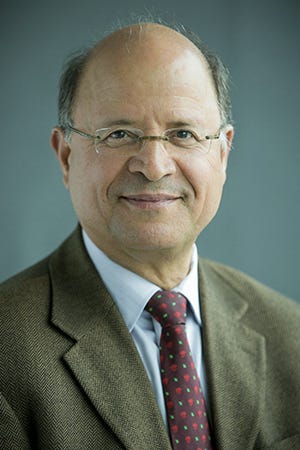Solidarity: An act of rebellion and a pathway to ecological peace
Can 'ecological solidarity' shift humans away from crisis and unlock a compassionate, just and peaceful future?
By Dr. Youssef Mahmoud — Senior Adviser at the International Peace Institute (IPI)
Much has been written about solidarity as a world changing idea as the foundation for social, economic and cultural rights and a means for addressing climate emergencies. It is a lived relationship that engenders transformative collective hope in times of adversity. Many African societies find the roots of solidarity in the Ubuntu philosophy of existence: “I am because we are.” Solidarity for them is the bond that binds one human to another beyond laws and social institutions.
And yet as we witness the gradual collapse of the world we have made, solidarity seems to be missing in action. Whether in Ukraine, Gaza or Sudan, violent conflicts are on the rise as a means for settling old and emerging disputes. They also seem increasingly difficult to end – traditional UN peacemaking tools don’t seem to be of much help. In many societies under stress, nationalistic and exclusionary policies, along with the demonisation of others, have sucked the oxygen out of solidarity, giving further impetus to those who have been advocating for ‘belonging without othering’.
Multilateral and national institutions, which are expected to encourage cooperation in the face of these and many other challenges, have not measured up to expectations. This year’s Global Solidarity Report finds that while public solidarity is more widespread than assumed, the institutional response has so far failed to match the gravity of the moment.
In addition to stagnation in the area of peace and security, institutions entrusted with international development cooperation have also struggled, largely because they find it hard to move beyond the ‘aid’ narrative. Steps taken by the UN General Assembly to promote a social and solidarity economy haven’t had the desired effect. Time will tell whether the proposed reforms in the much awaited UN Pact for the Future will help restore faith in multilateralism as a custodian of international solidarity.
Solidarity as an act of rebellion
In societies where governing structures are influenced by ruling elites focused on power than effective governance, a new grassroots radical form of solidarity is appearing. In these societies, people are calling for social, economic and ecological justice, equality and dignity, often risking much to convey their messages. In North America, Africa and South Asia these protests are spearheaded primarily by a disillusioned, post-millennial generation, ‘Gen Z’, who are seeking an end to politics as usual.
Referred to by some as the solidarity generation, these hyperconnected digital activists are increasing pressure on ineffective leaders and reimagining solidarity both within and between nations. Their efforts often blur artificial borders, reflecting that the causes driving their struggles transcend national boundaries. The recent youth-led anti-corruption street protests in Kenya and other parts of Africa provide an eloquent demonstration of this transnational phenomenon. A great deal of co-learning has taken place across countries, particularly with the use of crowdsourcing as a solidarity mechanism for mobilising financial resources. In Kenya these solidarity funds have been used to pay hospital bills and funerals brought on by the state’s violent response.
At a time when democracy is in retreat and authoritarianism and global inequalities are on the rise, taking a stand – often at a personal cost – appears to have become the choice for a growing number of citizens from the emerging generations. For many who want to be a voice rather than an echo, rebellion is not just about challenging authority or breaking the rules; it is an act of citizenship in solidarity with justice and, increasingly, with nature. And for such an act to be transformative, inter-generational solidarity is critical. It helps leverage the diverse perspectives and life experiences of youth and of good ancestors for the purpose of co-tomorrowing a more equitable future for all, while avoiding elite cooptation.
Solidarity as making peace with nature
For centuries humans have considered themselves separate from and superior to nature. This ideology has been used to justify the extensive extraction of Earth’s resources for ever-increasing consumption on a finite planet. The resulting ecological overshoot has placed humans as an endangered species. To help reverse this trend and prevent disputes over natural resources from fuelling more conflicts, some have called for ecological solidarity as a key step to make peace with nature. This means making room for a new type of peace that has been excluded from the dominant discourse, a peace that transcends human relations and involves being empathetic with all living beings, human and non-human.
This ecological interbeing involves embracing different understandings of solidarity and drawing inspiration from indigenous communities that have maintained healthy social and ecological relationships with the environment, where humans are integral but not central to planetary ecosystems. Many educators have turned to the Earth Charter and the Earthwise Constitution as a resource for nurturing this type of solidarity relationship with the Earth and are devising curricula that can catalyse the co-creation of a regenerative future for generations to come.
The primary aim of these reflections is to contribute to a pluriversal understanding of solidarity as an evolving paradigm for managing the collapse of an anthropocentric, exploitative system of governance and laying the foundations for compassionate, just and peaceful futures for both the planet and people.
This essay was originally published in the Global Solidarity Report 2024 to bring attention to the ways in which solidarity translates into impact for our world today and for future generations.
Dr. Youssef Mahmoud is Senior Adviser at the International Peace Institute (IPI) supporting the sustainable development, women peace and security, and peace operations programs and serving as focal point on conflict prevention and mediation policies and practices.
He is a former UN Under-Secretary-General and has headed peace operations in Burundi, the Central African Republic and Chad. He has held several other senior United Nations positions, notably as UN Resident Coordinator in Guyana and Director in the Department of Political Affairs at the UN headquarters in New York. In 2015 he served as a member of the UN Secretary-General High Level Independent Panel on Peace Operations and a member of the High Level Advisory Group for the Global Study on Security Council Resolution 1325 on Women, Peace and Security. In 2019, he led an independent strategic review of the UN peace operation in the Democratic Republic of Congo, in response to a UN Security Council Resolution.
He is currently a Visiting Professor at the African Leadership Centre in Nairobi, Kenya and King’s College, London and serves as Co-Chair of Home for Humanity, a citizen-led movement for planetary regeneration. Dr. Mahmoud has a PhD in Linguistics from Georgetown University, Washington, D.C.





